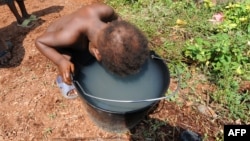GENEVA —
The U.N. Children’s Fund is announcing a record $2.2 billion appeal to provide emergency assistance this year for 85 million people, including 59 million children in 50 countries. While almost 40 percent of the appeal is for Syria and the nearby region, Africa remains the continent with the largest number of emergencies in the world.
The lion’s share of the money -- $845 million -- would pay for life-saving aid for some 10 million people, half of them children, in Syria and neighboring countries of refuge. Priority needs include immunization, water and sanitation, education and protection.
While Africa has many emergencies, UNICEF said two in particular stand out.
UNICEF’s director of emergency programs, Ted Chaiban, said it is urgent to position essential supplies in the Central African Republic and South Sudan before the rainy season begins in six to eight weeks.
"We are in a race against time,” Chaiban said. He has just returned from a weeklong visit to conflict-ridden South Sudan.
“In the case of South Sudan, the whole place becomes swamped, or most of the place becomes swamped. If you do not move now to pre-position supplies, to strengthen the services, have the resources in place to be able to address issues like malaria, issues like diarrheal diseases and the risk of cholera, issues like severe acute malnutrition, and food and security generally -- then we could be facing a catastrophe in 45 to 60 days,” said Chaiban
Fighting between the government and rebels in South Sudan broke out in mid-December. The U.N. estimates more than 730,000 people are internally displaced and another 130,000 have fled to neighboring countries. The majority of those affected are women and children.
While in South Sudan, Chaiban looked at the condition of displaced people in Minkaman and around the capital Juba. He was also able to visit some of the 38,000 people who have taken refuge in the U.N. compound in Malakal.
He said he was impressed by the work U.N. agencies are doing in providing essential services for these displaced populations.
“What is important is to be able to access that population and to do so quickly because the more time elapses, the worse the condition of the children that you reach, the more difficult it is to recover either from either malnutrition or diarrheal diseases or upper respiratory infections,” he stated.
Chaiban said $62 million is needed for emergency programs in Central African Republic this year and $75 million for South Sudan.
While those countries and Syria are in the headlines, he urged donors to remember other emergencies, such as Burma, Yemen and Afghanistan, where the desperate humanitarian needs of people are crying out for help.
The lion’s share of the money -- $845 million -- would pay for life-saving aid for some 10 million people, half of them children, in Syria and neighboring countries of refuge. Priority needs include immunization, water and sanitation, education and protection.
While Africa has many emergencies, UNICEF said two in particular stand out.
UNICEF’s director of emergency programs, Ted Chaiban, said it is urgent to position essential supplies in the Central African Republic and South Sudan before the rainy season begins in six to eight weeks.
"We are in a race against time,” Chaiban said. He has just returned from a weeklong visit to conflict-ridden South Sudan.
“In the case of South Sudan, the whole place becomes swamped, or most of the place becomes swamped. If you do not move now to pre-position supplies, to strengthen the services, have the resources in place to be able to address issues like malaria, issues like diarrheal diseases and the risk of cholera, issues like severe acute malnutrition, and food and security generally -- then we could be facing a catastrophe in 45 to 60 days,” said Chaiban
Fighting between the government and rebels in South Sudan broke out in mid-December. The U.N. estimates more than 730,000 people are internally displaced and another 130,000 have fled to neighboring countries. The majority of those affected are women and children.
While in South Sudan, Chaiban looked at the condition of displaced people in Minkaman and around the capital Juba. He was also able to visit some of the 38,000 people who have taken refuge in the U.N. compound in Malakal.
He said he was impressed by the work U.N. agencies are doing in providing essential services for these displaced populations.
“What is important is to be able to access that population and to do so quickly because the more time elapses, the worse the condition of the children that you reach, the more difficult it is to recover either from either malnutrition or diarrheal diseases or upper respiratory infections,” he stated.
Chaiban said $62 million is needed for emergency programs in Central African Republic this year and $75 million for South Sudan.
While those countries and Syria are in the headlines, he urged donors to remember other emergencies, such as Burma, Yemen and Afghanistan, where the desperate humanitarian needs of people are crying out for help.




